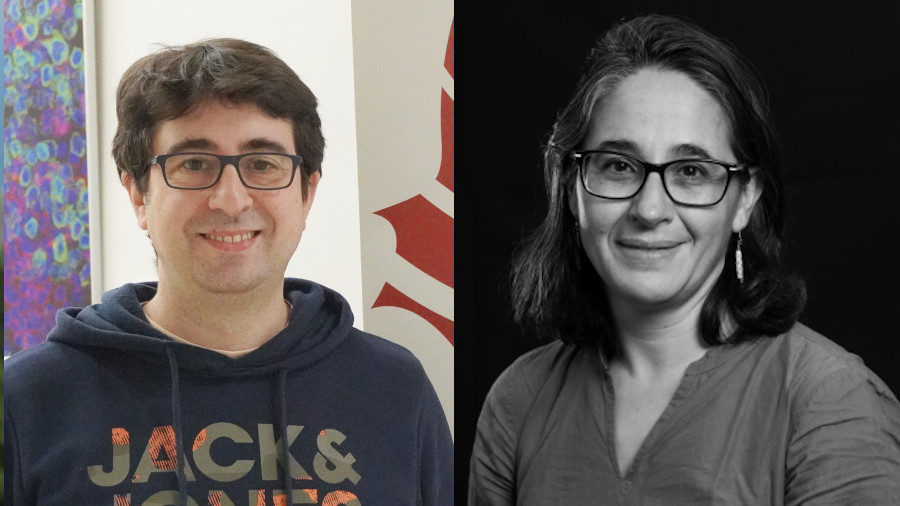Victoria Reyes-García and Albert Quintana receive an ERC Proof of Concept grant

RIDaGoP, a project by Victoria Reyes-García to enhance the governance of indigenous knowledge systems, and ResisCHIP by Albert Quintana, focusing on the rapid diagnosis of pathogens and resistances, have both been awarded a Proof of Concept grant from the European Research Council.
07/02/2022
Victoria Reyes-García, ICREA research lecturer at the ICTA-UAB and lecturer at the UAB Department of Social and Cultural Anthropology, and Albert Quintana, lecutrer at the UAB Department of Cell Biology, Physiology and Immunology and research at the UAB Institut de Neurociències (INc), were both selected, alongside 164 other researchers in Europe, to receive a Proof of Concept grant by the European Research Council (ERC).
Worth €150,000 each, this top-up funding is awarded to ERC grantees to explore the innovation potential of their scientific discoveries and bring the results of their frontier research closer to market or society. With the additional money researchers can, for example, investigate business opportunities, establish intellectual property rights, conduct technical validation, or explore the social benefits of their frontier research findings.
RIDaGoP Project
The "Research on Indigenous Data Governance Protocols" (RIDaGoP) project, by Victoria Reyes-García, will help create a toolkit to work with indigenous peoples on improving governance mechanisms for their knowledge systems, as information becomes increasingly present in the digital world. RIDaGoP aims to contribute to the operationalization of Indigenous data governance and sovereignty principles within open-data research contexts, using the ERC-funded LICCI project as a case study.
LICCI explores the potential of Indigenous and local knowledge (ILK) to contribute to climate change research, partly through a citizen science platform, aimed at strengthening the recognition and participation of Indigenous peoples and local communities (IPLC) in regional and international policy decisions around climate change impacts, mitigation and adaptation measures. In 2020, the project received additional funding to create the LICCI Observation Network, aimed at strengthening the recognition and participation of Indigenous peoples and local communities (IPLC) in regional and international policy decisions around climate change impacts, mitigation and adaptation measures. The new grant will help the LICCI team, led by Victoria Reyes-García, to create a toolkit to work with indigenous peoples and their knowledge systems as culturally significant information becomes increasingly digitalized, especially in open-data research contexts.
Over a 15-month period, and using the LICCI project as a case study, the Research on Indigenous Data Governance Protocols (RIDaGoP) project will contribute to the field of Indigenous Data Sovereignty (IDS) by developing a set of tools to guide the management of Indigenous knowledge and data in the open while adhering to Indigenous data governance principles.
Victoria Reyes-García holds a PhD in Anthropology by the University of Florida. She is and ICREA Research Professor at the Institute of Environmental Science and Technology of the Universitat Autònoma de Barcelona (ICTA-UAB), and since 2006, she coordinates the Laboratory for the Analysis of Social-Ecological Systems in a Globalised world (LASEG). She studies indigenous and local knowledge of the environment and the importance this knowledge can have to understand and deal with the climate and environmental crisis. She lived amongst the Tsimane, an indigenous community of the Bolivian Amazon, from 1999 to 2004. She has been awarded an ERC grant four times: a Starting grant, a Consolidator grant, and two Proof of Concept grants. In 2020, she received the Narcís Monturiol award from the Government of Catalunya and was elected international member of the US National Academy of Sciences, where she is currently the only woman from Spain to be member.
ResisChip Project
Resistance to antibiotics is one of the most important challenges we are now facing globally. At present, to determine the best treatment for infections, samples are taken from patients and bacterial cultures are conducted in order to test different drugs. This procedure is very slow and time is of the essence for critical patients. Recent proposals to improve this situation include using sequencing methods or systems based on PCR-techniques to analyse the genetic material of bacteria and detect which groups of antibiotics could be resistant. But this would only work with some pathogens or require extremely expensive machinery, and be preceded by a bacterial culture which would lengthen the time needed to achieve results.
Using a technology developed thanks to the funding of the ERC Starting Grant and the first ERC Proof of Concept grant, lecturer Albert Quintana's research group has designed a kit that rapidly concentrates, purifies and isolates bacterial RNA: the ResisCHIP. The idea is to identify, using a patient's blood sample, thousands of pathogen genes in less than two hours, without the need of bacterial cultures. This would allow choosing the best treatment quickly, thus preventing antibiotic resistance and the worsening of symptoms. This second ERC Proof of Concept grant will allow the group to advance in the development and clinical validation of the kit.
Albert Quintana leads a research group in mitochondrial diseases at the UAB Department of Cell Biology, Physiology and Immunology and is group leader at the UAB Institut de Neurociències. He earned a Bachelor in Science in Biology (Biomedicine) in 2001 and a PhD in Neuroscience in 2007, both from the Universitat Autònoma de Barcelona. His PhD focused on the role of cytokines in the development of neuropathology and neuroinflammation in traumatic brain injury. As a postdoctoral researcher (2008-2013), he joined Dr Richard Palmiter's lab at the University of Washington, Seattle, where he was the lead scientist developing and characterising a mouse model of mitochondrial disease (Leigh Syndrome). In 2013 he was appointed Assistant Professor in the Department of Pediatrics (University of Washington) and group leader at the Seattle Children’s Research Institute. In 2015 he returned to the Universitat Autònoma de Barcelona as a Ramón y Cajal researcher and ERC grantee (Starting Grant). His research focuses on using a multi-level approach and developing new tools to identify the molecular determinants of neuronal susceptibility to mitochondrial disease. He has authored 50 research articles and 2 book chapters.